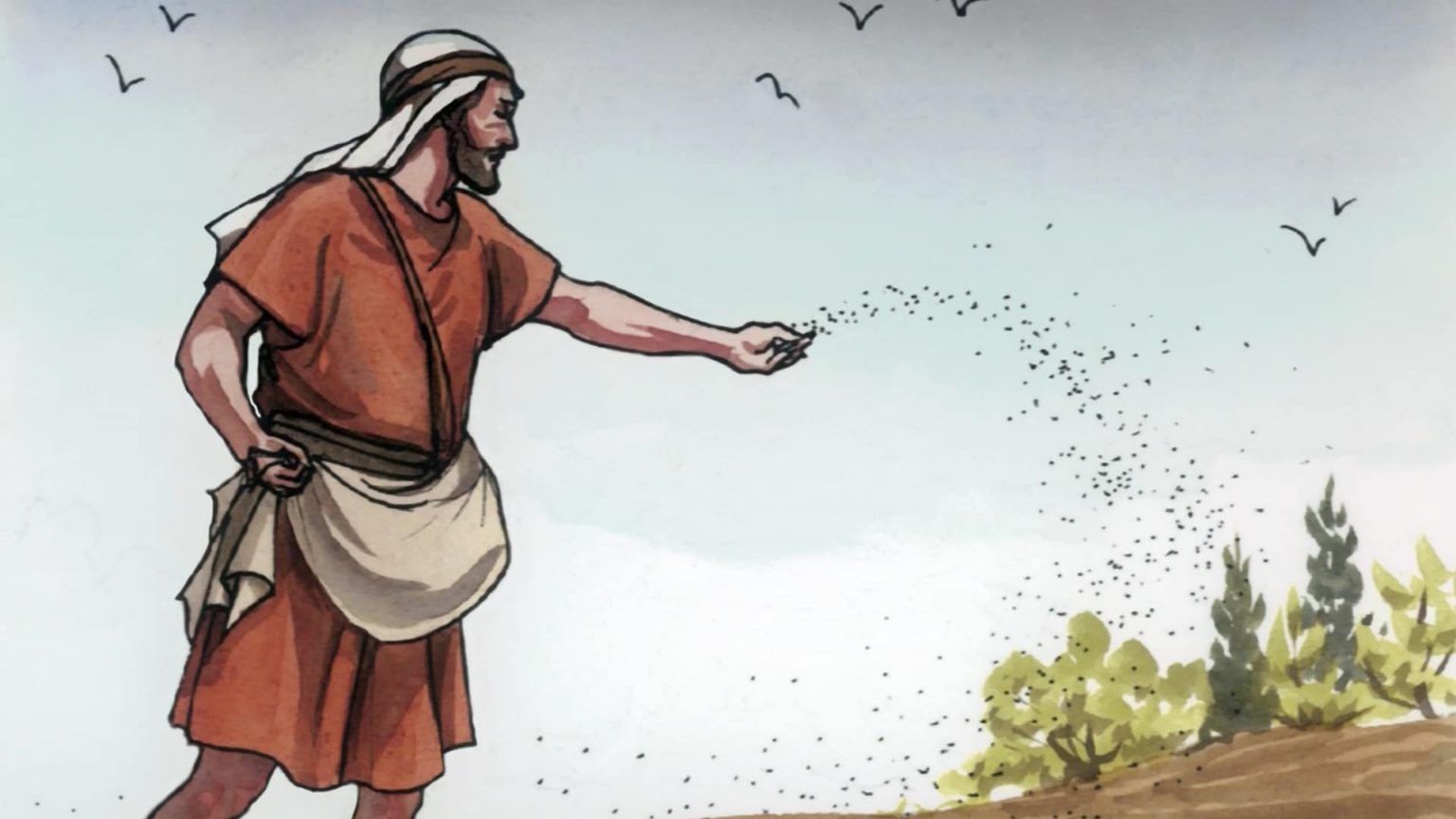The Parable of the Sower of Matthew from the Bible
The Parable of the Sower , is one of the great stories found in the Bible, this teaching belongs to 3 of the 4 gospels of the New Testament, which are the book of Matthew, Mark and Luke. In the following article we will know everything related to this significant teaching.
The Parable of the Sower
On this occasion we will know everything related to one of the most significant teachings of the sacred scriptures, it is the Parable of the Sower, which is mentioned in 3 of the 4 gospels of the New Testament of the Word of God.
In this parable we have all the possible results on the seed of the Word of God. As can be known in the first category, the Word does not enter the hearts of the recipients who symbolize the earth. Because they didn’t believe her. Otherwise, in the case of the second and third categories, both received the Word, however, neither of them managed to bear the fruit.
Why? This is what we are going to explain during the following article since the answer to this question is interpreted in different ways. Finally, the fourth category became the only one that got to hear the Word of God, the only one that received it and also bore fruit. Our focus in this article is going to be on why the word of God was not received in the first 3 and why in the last one, which is the fourth, yes.
Next, we are going to read the Parable of the Sower as told in 3 of the 4 books of the New Testament Gospels, which are Matthew, Mark, and Luke.
Matthew 13:1-9; Mark 4:1-9 and Luke 8:5-8
We will start first with the first Book of the New Testament and the first of the Gospels which is Matthew 13:1-9, which reads as follows:
“That day Jesus left the house and sat by the sea. And many people joined him; and getting into the boat, he sat down, and all the people were on the beach. And he spoke many things to them in parables, saying, Behold, the sower went out to sow. And as he sowed, some of the seed fell by the wayside; and the birds came and ate it up.
Some fell on scree, where there wasn’t much soil; and it sprouted quickly, because it had no depth of earth; But when the sun came out, it was burned; and because it had no root, it withered. And part fell among thorns; and the thorns grew up, and choked her. But some fell on good ground, and bore fruit, some a hundredfold, some sixtyfold, and some thirtyfold. He who has ears to hear, let him hear.”
Now, let’s read what the Second Book of the New Testament says and also the Second of the Gospels, which is Mark 4: 1-9, which says as follows:
“Again Jesus began to teach by the sea, and a large crowd gathered around him, so much so that he got into a boat and sat in it on the sea; and all the people were on land by the sea. And he taught them many things in parables, and he said to them in his doctrine: Hear: Behold, the sower went out to sow; and as he sowed, it came to pass that some fell by the wayside, and the birds of heaven came and ate it up.
Another part fell on scree, where it did not have much soil; and it sprouted quickly, because it had no depth of earth. But when the sun came out, it was burned; and because it had no root, it withered. Another part fell among thorns; and the thorns grew and choked it, and it bore no fruit. But another part fell on good ground, and bore fruit, for it sprouted and grew, and produced thirty, sixty, and a hundredfold. So he said to them: He who has ears to hear, let him hear.”
Finally, we culminate with the Third Book of the New Testament and also the third of the Gospels of the Bible, which is the Book of Luke 8:5-8, which reads as follows:
“And as a large company gathered, and those who were in each city came to him, he said by a parable: One who sowed went out to sow his seed; and as he sowed, some fell by the wayside, and was trodden down; and the birds of the sky ate it. And another part fell on the stone; and born, it withered, because it had no moisture. And another part fell among the thorns; and the thorns growing together, they choked her. And another part fell on good ground, and when it was born, it bore fruit a hundredfold. Saying these things he cried out: He who has ears to hear, let him hear.”
interpretations
It can be said that there are many Scholars, who express their interpretations in relation to this teaching of the Bible, in this sense most of them usually state that the parable of the sower is under a very particular perspective, that is to say that despite all the failures that are evident in the story, finally the planting of the so-called “seed” would become successful, which will take root and produce many “fruits”.
According to the Q source, which establishes that the book of the gospel of Mark became the first of the 4 synoptic gospels to be written, the parable of the sower which would also be the first parable to be written, for it is the first parable of this book.
Mark uses this in order to highlight the kind of reaction that the previous teachings of the Lord Jesus Christ have come to have on people, as well as the kind of reaction that the Christian message has been able to have in the world in the course of the 3 decades since the ministry of Christ to what is the writing of the Gospel. The parable has come to imply on certain occasions that there are at least 3 “levels” of divine progress and also of salvation.
From the Church of Jesus Christ of Latter-day Saints
According to the various interpretations of all the members and also the great majority of the leaders of the Church of the Lord Jesus Christ of Latter-day Saints, which is better known as the LDS Church, not everyone can come to accept the Gospel with the same kind of degree of commitment.
The parable is the one that clearly teaches us where the responsibility comes to fall with respect to what the Kingdom of God is and also about the reception of the Gospel. It was not found in the sowing and it is not found in the seed but it is found in the “soil”, that is, in the heart of man.
A man named Joseph Smith, who is the founder of Mormonism, even suggests that the parable of the sower is one that demonstrates the types of effects that have been produced by the preaching of the Word, and he is also the one who believes that this parable manages to manifest essential aspects about the Kingdom of God at that same time.
It can be said that in the 19th century, some important characters came to express their interpretations in relation to this parable, that is how a President named Heber C. Kimball expressed that this teaching was one of the best stories to strengthen the faith of every believer. , as it allows them to withstand challenges.
Analysis of the Jesus Seminar
The so-called “Jesus Seminar”, becomes the first and most significant project related to this topic, the well-known “Westar Institute”, usually classifies this parable as an important and authentic teaching. In the same way as the authentic sayings of the Lord Jesus, in the parable a kind of simple image is used and also an oral (rather than written) style. They, however, came to reject, on the other hand, the allegorical interpretation that is written as a kind of original elaboration with no link to Jesus, even though it is reformulated in the book of Matthew.
Jesus explains the Parable of the Sower
Very well, now the most important thing, the interpretation that is given by the Lord Jesus himself which can be observed in the same books of Matthew 13:18-23, Mark 4:13-20 and in the book of Luke 8:11 -fifteen. To get an idea of what the Lord said about the parable of the sower, let’s see what the book of Matthew chapter 13, verses 18 to 23, says:
“Hear, therefore, the parable of the sower: When someone hears the word of the kingdom and does not understand it, the evil one comes and snatches away what was sown in his heart. This is the one that was planted by the wayside. And he who was sown on stony places, this is he who hears the word, and immediately receives it with joy; but it has no root in itself, but is of short duration, because when affliction or persecution comes because of the word, then it stumbles.
He who was sown among thorns, this is he who hears the word, but the eagerness of this age and the deceit of riches choke the word, and it becomes fruitless. But he who was sown on good ground, this is he who hears and understands the word, and bears fruit; and he produces a hundred, sixty, and thirty times one”.
Matthew 13: 18-23
Reflection:
This so-called parable of the sower becomes one of the few that is usually presented in the gospels where its explanation by the Lord Jesus is also recorded, and it becomes vital for the believer who generally preaches to the believers. non-Christians, so that they can understand that every time we are going to announce the message of the gospel, it happens that the word can even take one of these 4 paths or directions in the receptive person who hears it.
In the fragment of verses 1 to 9 the story is told, and in the case of verses 18 to 23, it is possible to speak of spiritual truth, and it is not that we are surprised when we preach the good news, and if we cannot see the expected results, and it even becomes very likely that on some occasions the person may become discouraged because they do not see the fruit of the gospel in all those people they love and want to be transformed by the power of God .
However, one can and must persevere in prayer and supplication so that the mercy of the Almighty Lord is the one that grants them true repentance with all their hearts. When the Lord Jesus was on earth on certain occasions he came to speak in allegories, simile, metaphors and even in parables, and many used to be disturbed by this way in which the Master preached to all the Jews of his time, however, we must come to understand that when we always announce the gospel, it becomes the Lord Jesus who sends us, as he clearly says in his word in the book of John 13:20:
“Truly, truly, I say to you, whoever receives the one I send receives me; and whoever receives me, he receives the one who sent me.” Now we are going to give a brief Summary of the Parable of the Sower of each one of the portion of the earth in which the seed of the word fell:
Part One: The Seed that fell by the wayside
In the first part of the earth where the seed fell, it was next to the road and then the birds came and ate it, this represents all those who hear the word of the kingdom and do not understand it or receive it, as it comes to say the word of God in the book of 2 Corinthians 4:3-6, which goes like this:
“But if our gospel is still hid, among those who are lost it is hid; in which the god of this age has blinded the understanding of the unbelievers, so that the light of the gospel of the glory of Christ, who is the image of God, does not shine on them. Because we do not preach ourselves, but Jesus Christ as Lord, and ourselves as your servants for Jesus’ sake. Because God, who commanded that light should shine out of darkness, is the one who shone in our hearts, to illuminate the knowledge of the glory of God in the face of Jesus Christ.
Second Part: The Seed that fell on Stones
In the case of the second part of the seed that fell on the stony or on the stones, and there was not much soil and that grew quickly, however, when the sun came out they burned and because they could not take root they withered, these arrive to be all those who listen to the word of the Lord and of his kingdom and receive it with great joy, however, it becomes of a very short duration, because when all the persecutions or tribulations come, they are scandalized, however , the word of the Lord comes to say in the book of 1 Peter 1:6-9, the following:
“In which you rejoice, although now for a little while, if necessary, you have to be afflicted in various trials, so that your faith, much more precious than gold, which, although perishable, is tested with, may be tested. fire, be found in praise, glory and honor when Jesus Christ is manifested, whom you love without having seen him, in whom believing, although now you do not see him, you rejoice with ineffable and glorious joy; obtaining the end of your faith, which is the salvation of your souls.”
On this type of topic there are usually many biblical quotes. At this time many do not want to preach the gospel completely, for the simple fear of being rejected at work, as well as at school, in universities, by their own neighbors, and also in the ministerial sphere for great fear of being rejected. that the members of the church go to another church where it is possible to preach in a much lighter and more modern way.
Many become those who have wanted to achieve the conversion of a believer in a single phrase or in a play on words without having to have true repentance, which is what transforms the heart of man by the power of the Spirit of God.
If we preach the Lord Jesus Christ, we must come to understand that we are all pilgrims on this earth, and that our citizenship is not of this world, but is in heaven, so we must preach the gospel regardless of whether we suffer or suffer. if we are persecuted for the great cause of the word with an enormous ineffable joy.
And that we are not ashamed of the gospel that we preach, and if we do it in another way, then we are denying what Christ said would happen to those who wanted to come to preach the sincere gospel, with a contrite and humbled heart, so We must remember what the word of God says in 1 Corinthians 10:13:
“No temptation has overtaken you that is not human; but faithful is God, who will not let you be tempted beyond what you can bear, but he will also provide a way out with the temptation, so that you can endure.”
Part Three: The Seed that Fell Among the Thorns
In the case of the third part of the seed that fell among the thorns, and the thorns grew and choked it, all these are the ones who hear the word, however, the eagerness of this earthly world and also the deceitfulness of riches are those who stifle the word and make it fruitless, so let’s see that this part of the earth becomes similar in certain ways to the second, however, here they still hear, receive the word however, the desire of this world is the one that floods us and also competes against their hearts, always diverting them from the true faith.
And, what is the desire of this world? In the book of 1 John 2:15-17 it says: “Do not love the world, neither the things that are in the world. If anyone loves the world, the love of the Father is not in him. Because everything that is in the world, the desires of the flesh, the desires of the eyes, and the pride of life, does not come from the Father, but from the world. And the world passes, and the wishes of him; but he who does the will of God lives forever.”
At this time we can all observe the world that is obsessed with sports, as well as with music, movies, and video games, all this is what it does as part of the entertainment that comes to meet the satisfactions of the flesh in the world, and on certain occasions people want to live the Christian life closely linked to this kind of earthly life.
Part Four: The Seed That Fell on Good Ground
In the case of the last seed that fell on good ground that bore fruit, it is all those who listen to the word of the kingdom and understand it, so let’s see what it says, that they “hear and understand” it, only in this earth the word is said that if they understand it, because in the first the same word of the Lord says that “they do not understand”, this means that as Christians we must understand, and this type of understanding is not only knowledge with faith, because in the book of James 1:22, it says:
“But be doers of the word, and not hearers only, deceiving yourselves” , and in order to be doers, we must all have a root, and also be in the true vine that becomes Christ, if we do not remain in Him we cannot manage to give the fruit of the Spirit in the believer, so that Christ is the only exalted one in all of us.
If you liked our article on the Parable of the Sower in the Book of Matthew, we invite you to visit the following articles which may be of interest to you:


![In today's article we will teach you some prayers so that you can ask Jesus of the Great Power for help. His prayer for him can be used for multiple things and if you do them with faith and trust in him, we assure you that he will intercede to answer your requests. prayer to jesus of great power Table of Contents [ Hide ] 1 Prayer of the Great Power of God 1.1 Prayer to Jesus of Great Power for Desperate Cases 1.2 Prayer of Jesus of the Great Power for Difficult Desires 1.3 Prayer to Jesus of the Great Power to Request Help 1.4 Prayer to the Great Power of God to Ask for Protection Prayer of the Great Power of God Below we show you different prayers of Jesus of great power to help you with different problems that may affect you. We recommend that you read them all and select those that best fit the difficulty you are going through. Prayer to Jesus of Great Power for Desperate Cases As the name implies, this prayer is ideal for when you are under a complicated problem or a complex situation from which you cannot find a way out. Performing this prayer will cause Jesus to intercede for you and help you find the right path. « O my Jesus of great power! I trust with all my soul and heart in you, that's why I come in my despair, since today I feel discouraged and abandoned. My beloved Jesus! I seek your help and understanding, offer me help with your immense power and mercy in this sadness that overwhelms me and this anguish that causes me so much suffering. Strong arm and protector of mine, do not abandon me in this hurried trance in which I find myself. Don't let me drown in my worry anymore. You who know everything; assist me, protect me and shelter me at this precise moment. Don't stop listening to my pleas Jesus, the pleas of this downcast and desperate soul. Keep in mind the tears of this sad and afflicted heart but totally full of love for You. prayer to jesus of great power You who are my only friend, father and protector. My Jesus, Jesus of my soul! I beg you to assist me in this difficult situation: (in this space pause the prayer and indicate the problem or situation that affects you and for which you want Jesus to intercede. Then continue with the rest of the prayer). I hope that my pleas full of love and hope are able to reach you, who are the strong and protective arm. Oh my Jesus! That you are the one who can do everything. Oh my Jesus, Jesus of my soul! You who carried the cross and are my hope, my consolation, my refuge; come to me with your crown of thorns loaded with your heavy cross and with the rope around your neck, so that you relieve my terrible sufferings. Oh my Jesus, Jesus of great power! May your divine eyes contemplate my needs and your sacrosanct ears listen to my pleas. I have full confidence in you; for this reason I implore you with all my faith, security and hope. Do not leave me without help in my affliction and may it always be blessed and praised with your most holy will. Amen « . Once the prayer is finished, it is recommended to finish the prayer by praying a Creed, an Our Father and the Glory. In addition, the ideal is to perform this prayer for three consecutive days. Great Power Jesus Prayer for Difficult Desires If you have a request to make that you consider very difficult to achieve, this prayer is ideal for it. You just have to entrust yourself to the Lord Jesus of Great Power through the following prayer: « Oh my Jesus, receive this act of contrition that we make with sincerity and appealing to your goodness; forgive our faults, sins and ingratitude and cleanse us of all hatred, resentment or baseness. You who came into the world to free us from all evil, protect us from every plan and cunning of the enemy, from everything that can affect us and make us suffer, take away our concerns and make us perceive your peace. O Jesus! You who grant us your support with tenderness, increase our faith and submission to your adorable will, give us a heart capable of loving as you love us. That way we will know how to give you our hearts without fear and open it to your grace. Have mercy on us that with faith we entrust ourselves to you. My lord, without you we are nothing, with you we can do everything. You are our good shepherd and you lead us on the right path, so we beg you to never leave us. Confirm us in the certainty that you will be with us giving us your love until the end of our days and grant us the peace that your gospel promises. I am yours and from today I want to live only on your love, waiting for the day that you lead me to eternity, may it be so forever. Amen « . prayer to jesus of great power Prayer to Jesus of Great Power to Request Help The following prayer can be used for various reasons and requests, so it will serve for any occasion in which you need to entrust yourself to the Lord Jesus of Great Power: « Blessed Jesus of the Great Power, you who are the strong arm that can do everything. Supreme monarch, son of the eternal father. I always trust you, since with you by my side I fear nothing. Well, you are my hope. Oh my good Jesus! I hope you never forget us or forsake me. I believe in your goodness and your mercy, therefore I give you all my love and my devotion. Oh sweet Jesus! placed at the right hand of God the Father. You who are tender, just and compassionate. May you never stop helping me and favoring my beloved Jesus. To those of us who come to you with simplicity and hope, I beg you to heed my pleas. (In this space we ask Jesus to help us in what we want to solve, then we continue with the prayer). My Jesus Lord of great power, I have humbly presented you with my needs and my difficulties, please listen to my plea and give me the hand of your grace so that I can achieve my desires. Embrace me with your love and answer the request of my soul. Jesus infinitely good and powerful, you who are my lord and my king. For your mercy, for your sacred blood spilled and for all your passion; Give me your miraculous hand in my falls and transmit your wisdom to correct my defects. Make me possessor of the virtues of your passion and death so that by living a good life in this world and following in your footsteps, I may be able to see you risen and glorious in eternal life. To praise you forever in the company of the Virgin Mary, all the saints, the angels of heaven and the Holy Spirit. Amen « . Since this prayer to the Jesus of Great Power is meant to be prayed when you feel the need to ask for help (and this can happen even several times a day), you can use it whenever you see fit. You can pray whenever you require a specific request or when you feel that you do not find the solution or way out of problems, either physically or emotionally. On the other hand, if you consider that the problem you are going through is too big and intense, you can pray for three consecutive days, preferably at the beginning of the day and before going to sleep. In addition, it is advisable to accompany the prayer by lighting a white or purple candle before beginning the prayer. This candle must remain lit and must be replaced every day, that is; one candle per day. Prayer to the Great Power of God to Ask for Protection Useful prayer to request protection from Jesus of the Great Power for you and your loved ones from all evil that wants to harm you: « May the Great Power of God be worth the strength of the faith of Jesus Christ and always accompany me. May the purification be with me. May the Consistory of the Holy Trinity break the strength of my enemies, so that they do not harm me, or my children, or my benefactors. Jesus Christ the Redeemer who defeated the world from the cross. Defeat my enemies for the death you had. Amen « . It is important to highlight that the prayer must be repeated three times, beginning in each case with a Credo and ending in the same way with a creed. Also; Once this prayer is finished, it is recommended to pray the Novena of San Miguel .](https://thefearlab.com/wp-content/uploads/2022/10/jesus-15-768x1156.webp)



